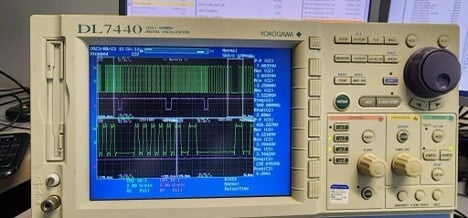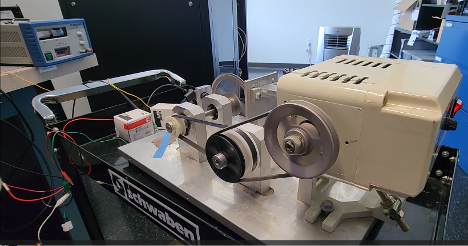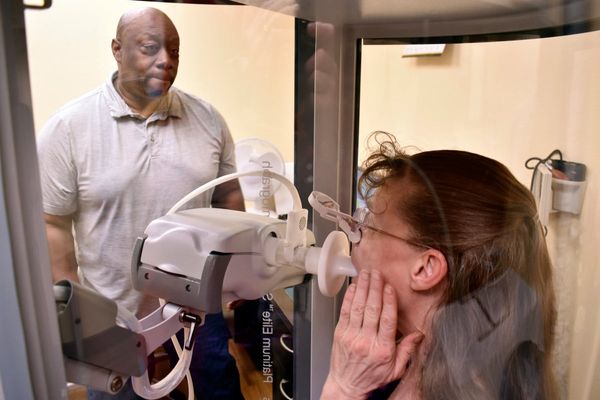You rely on your car’s sensors every time you drive — whether they’re detecting nearby vehicles, keeping you in your lane, or helping the engine perform smoothly. But before those systems can operate reliably on the road, they must be developed, tested, and fine-tuned with precision.
It’s a challenge Dr. Muhammad Fahad has spent his career addressing.
An electrical engineer with a strong background in signal processing, Dr. Fahad works at the intersection of research and real-world automotive engineering.
His contributions include developing tools that reduce the cost and complexity of engine testing and publishing research on signal processing that’s used by engineers and researchers around the world.
He has designed algorithms that help vehicles interpret sensor data faster and more accurately — particularly in fast-moving environments where safety decisions must be made in milliseconds, such as advanced driver assistance systems (ADAS).
This article explores how Dr. Fahad’s work is shaping modern automotive systems. From misfire detection in diesel engines to future improvements in LiDAR and RADAR signal integration, his career offers insight into how advanced engineering is driving innovation in today’s vehicles.
Academic Research with Global Reach
Dr. Fahad holds a PhD in electrical engineering from Michigan Technological University. His research focused on time-constrained sensor environments — systems that must make fast and accurate decisions with limited information.
His work includes modeling and analysis of vector Poisson and Gaussian channels, heuristic sensing methods, and multi-target detection. These studies support applications in industries where real-time sensor decision-making is essential, including automotive systems.
His research has been published in multiple peer-reviewed journals and is regularly downloaded by global universities, research institutions, and engineers. This global engagement reflects the practical value of his findings.
In addition to his research, Dr. Fahad serves as a reviewer for IEEE Transactions on Signal Processing, one of the field’s most respected journals. His contributions help evaluate and refine some of the most current developments in signal processing.
From Theory to Practice in Automotive Engineering
Dr. Fahad has applied his academic expertise in industry, including during his time at IAV Automotive Engineering Inc. in Michigan. There, he developed a crank and cam signal generator for a six-cylinder heavy-duty diesel engine.
This tool simulates engine behavior under a wide range of operating conditions, eliminating the need for physical engine testing during early ECU calibration. It reduces fuel consumption, cuts testing time, and improves efficiency — all while enabling engineers to identify and resolve misfire scenarios in a controlled lab environment.

Precise crank and cam signal generated from the low cost and portable signal generator for fast testing time, used in HiL testing setup. (Location: HiL lab, IAV Automotive Engineering Inc, Michigan, USA 2024.)

Developed model of simulated crank and cam signal generator for fast HiL testing. (Courtesy of IAV Automotive Engineering, Inc, Northville, US, 2024)
This signal generator is now a proprietary tool that supports efficient engine development and calibration workflows.
In parallel with his work on engine systems, Dr. Fahad contributed to hybrid vehicle development. He worked on customizing torque and speed control algorithms for Permanent Magnet Synchronous Motors (PMSMs), which are used in series-parallel hybrid drivetrains.
These algorithms help ensure efficient motor performance and compliance with emissions standards from regulatory bodies such as the EPA and CARB.
Dr. Fahad’s engineering skill set includes model-based software development in MATLAB/Simulink, calibration using ETAS INCA and MDA, and working with communication and diagnostic protocols including CAN, OBD-II, and SAE-J1939. His experience spans both software and system-level integration for automotive control systems.
Contributions to ADAS and Sensor Fusion
Dr. Fahad’s work also extends into advanced driver assistance systems (ADAS), where vehicles must process large amounts of sensor data in real time. These systems rely on multiple sensor inputs — including LiDAR, RADAR, ultrasonic, and camera-based technologies — to make accurate driving decisions.
Combining these different data streams into one reliable model of the driving environment requires advanced signal processing. Dr. Fahad’s academic research supports this effort by addressing how sensor data can be prioritized, filtered, and interpreted under time and bandwidth constraints.
This work plays an important role in enabling features such as lane keeping, collision warnings, and adaptive cruise control — all of which require fast and dependable sensor integration.
He continues to focus on refining the algorithms that power these systems, particularly in hybrid and electric vehicles, where computing resources must be used efficiently and precisely.
Engineering Career and Early Experience
Dr. Fahad completed his bachelor’s degree in electronic engineering at Mehran University of Engineering and Technology in 2005. He graduated with distinction, receiving both the gold medal for the highest GPA in the faculty and a silver medal for academic excellence in his department.
He went on to earn a master’s degree from the University of Engineering and Technology in Lahore, followed by a second master’s and a PhD from Michigan Technological University.
Earlier in his career, he worked on rural electrification projects in Sindh province, Pakistan. His responsibilities included designing solar-powered water pumping systems for remote communities, calculating energy requirements, programming variable frequency drives (VFDs), and building telemetry systems to monitor energy usage.
He also served as a maintenance engineer at Suleman Roshan Hospital as part of his Fulbright service commitment. In that role, he managed emergency backup power systems and assisted in maintaining ECG and diagnostic equipment. This experience further developed his ability to troubleshoot and maintain mission-critical systems under resource-constrained conditions.
Teaching and Ongoing Projects
In addition to his engineering roles, Dr. Fahad has taught undergraduate courses in electrical machinery as an adjunct assistant professor in the Department of Applied Computing at Michigan Tech.
His teaching included core electrical systems used in vehicles and industry, such as DC machines, three-phase induction motors, and synchronous machines.
Today, Dr. Fahad continues to grow his technical portfolio through independent consulting. His current areas of focus include:
- Model-based software development for vehicle systems
- Signal processing for sensor fusion in ADAS platforms
- Calibration and testing of hybrid electric vehicle ECUs
- Research into improved LiDAR and RADAR signal processing
- Simulation tools that replace traditional engine testing methods
He recently passed the Fundamentals of Engineering (FE) exam and is pursuing licensure as a Professional Engineer (PE) in the state of Michigan.
Looking Ahead: Building Technology That Performs Under Pressure
Dr. Fahad’s ongoing goals focus on advancing sensor reliability, diagnostic speed, and testing efficiency in automotive systems. He is working on improved onboard diagnostics for hybrid electric vehicles, better real-time fusion of LiDAR and RADAR signals, and more robust algorithms for signal prioritization in high-speed environments.
He also sees value in reducing the resource burden of traditional testing through simulation — allowing automotive teams to test engine behavior or control logic without needing full physical prototypes early in development.
This kind of work supports faster, cleaner, and more cost-effective engineering. By continuing to refine how vehicles collect and process sensor data, Dr. Fahad aims to help shape safer and smarter systems that can respond accurately to real-world challenges.







